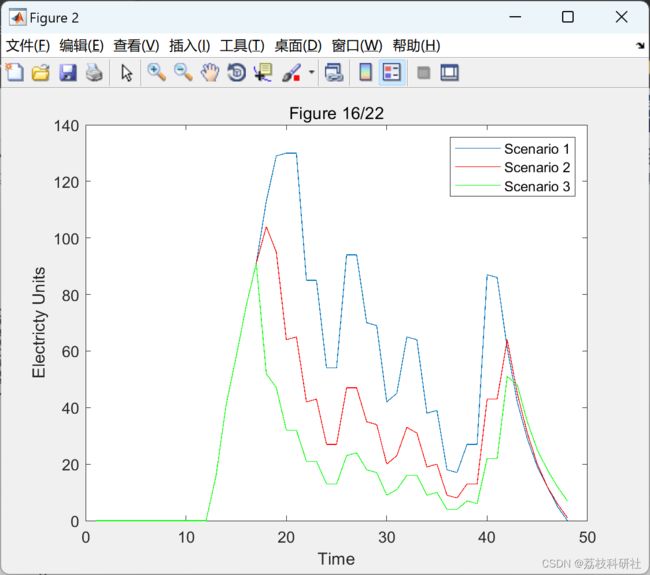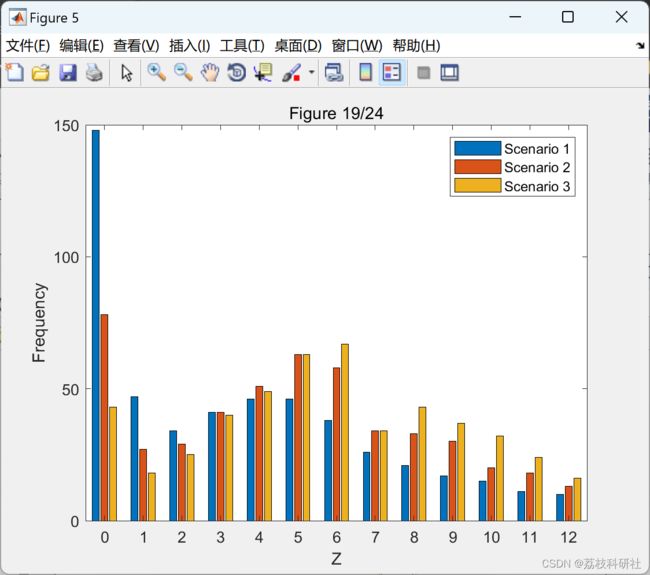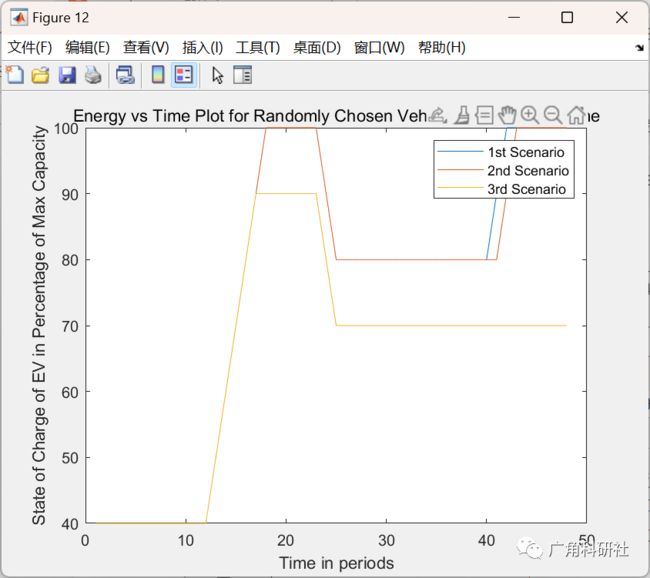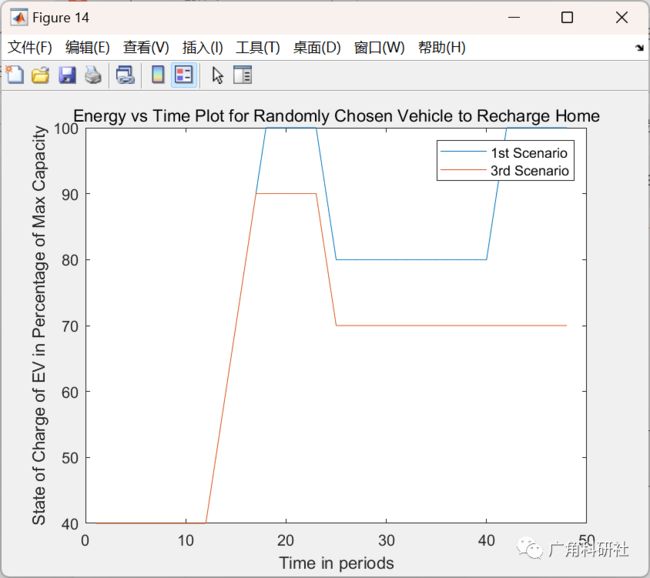- mayavi实例
鄧寜
matlabpython开发语言
Mayavi是一个用于三维可视化的Python库。它可以用于绘制三维图形、曲面、等值线和点云数据。它使用VTK后端进行绘图,并提供了一个类似于MATLAB的界面,使用户能够轻松地创建复杂的三维图形。示例:frommayaviimportmlab#生成等值线数据x,y,z=mlab.test_plot3d()#使用mlab.contour3d绘制等值线mlab.contour3d(x,y,z)#显示
- matlab下载安装教程
chengxuyuan66666
matlab
MATLAB的下载和安装过程相对直接,但需要注意选择与您的操作系统兼容的版本,并确保拥有有效的许可证密钥(如果是正式版)。以下是一个详细的MATLAB下载和安装教程:一、下载MATLAB访问MATLAB官网:打开浏览器,前往MathWorks官方网站(https://www.mathworks.com)。选择版本:在官网上,导航到下载页面,并选择适合您操作系统的MATLAB版本。常见的版本包括MA
- 基于JavaWeb的原色蛋糕商城的设计与实现
yh1340327157
计算机毕业设计实战案例java-eestrutskafkatomcathibernateintellij-ideaspring
开发环境开发语言:Java框架:springbootJDK版本:JDK1.8服务器:tomcat7数据库:mysql5.7(一定要5.7版本)数据库工具:Navicat11开发软件:eclipse/myeclipse/ideaMaven包:Maven3.3.9浏览器:谷歌浏览器后台路径地址:localhost:8080/项目名称/admin/dist/index.html前台路径地址:localh
- 基于Simulink的电力系统中的发电机励磁控制的状态反馈控制器仿真
小蘑菇二号
手把手教你学MATLAB专栏手把手教你学Simulinkmatlabsimulink
目录基于Simulink的电力系统中的发电机励磁控制的状态反馈控制器仿真实例项目详细介绍1.系统架构1.1系统组成2.搭建Simulink模型
- JAVA毕业设计高校学生智慧党建系统设计与开发计算机源码+lw文档+系统+调试部署+数据库
瑞致网络
java开发语言
JAVA毕业设计高校学生智慧党建系统设计与开发计算机源码+lw文档+系统+调试部署+数据库JAVA毕业设计高校学生智慧党建系统设计与开发计算机源码+lw文档+系统+调试部署+数据库本源码技术栈:项目架构:B/S架构开发语言:Java语言开发软件:ideaeclipse前端技术:Layui、HTML、CSS、JS、JQuery等技术后端技术:JAVA运行环境:Win10、JDK1.8数据库:MySQ
- JAVA儿童教育系统计算机毕业设计Mybatis+系统+数据库+调试部署
七七科技
数据库javamybatis
JAVA儿童教育系统计算机毕业设计Mybatis+系统+数据库+调试部署JAVA儿童教育系统计算机毕业设计Mybatis+系统+数据库+调试部署本源码技术栈:项目架构:B/S架构开发语言:Java语言开发软件:ideaeclipse前端技术:Layui、HTML、CSS、JS、JQuery等技术后端技术:JAVA运行环境:Win10、JDK1.8数据库:MySQL5.7/8.0源码地址:https
- Matlab plot画图坐标字体、字号、范围等设置
yyytucj
matlab
clcclearallfigure(1);x=0:0.2:8;plot(x,sin(x),'-k','LineWidth',4);set(gca,'linewidth',1,'fontsize',20,'fontname','Times');%依次设置坐标轴的属性分别为:坐标轴的线宽(2),坐标轴的刻度字号大小(20),坐标轴的刻度字体(罗马体)。legend('sinx');gridonxlab
- MATLAB中的矩阵索引
yyytucj
python算法数据结构
利用矩阵的索引取出原矩阵的子集元素是一种有效的方式。MATLAB的多种索引不但类型强大、灵活,而且表达清晰易读。在理解电脑MATLAB编程方面。体会MATLAB以矩阵为导向思想的高效性,掌握索引便是一种最佳方式。索引也和MATLAB用户经常听到的另一个属于“矢量/向量”紧密相关。矢量化意味着使用MATLAB的语法结构替代循环这一语法,能够使程序运行得更快、更具有可读性。当今大多数向量化的技术,许多
- 用matlab绘制箭头
yyytucj
算法
用matlab绘制箭头用matlab绘制箭头1.quiver和quiver3命令这两个命令适合画关于“场”中向量的图,不适合于画单个剪头,而且放大之后,剪头不是很好看如:[X,Y]=meshgrid(-2:.2:2);Z=X.*exp(-0.5.*X.^2-Y.^2);[DX,DY]=gradient(Z,.2,.2);contour(X,Y,Z)holdonquiver(X,Y,DX,DY)co
- MATLAB设计控制系统仿真实验,基于MATLAB的自动控制原理实验仿真系统的设计
stellagugu
一、引言《自动控制原理》是自动化专业的基础课程,是控制科学与工程学科的一门方法论课程,主要培养学生掌握控制系统的分析和设计方法,其内容之多,理论性之强,决定了课程学习的难度。而实验课作为课堂教学的辅助内容,是培养学生自主性和创新性的重要环节。目前实验室的实验教学采用模拟电路实验台,将集成电路模块进行连线,形成典型系统,通过示波器观察响应曲线。传统性实验训练了学生对以传递函数为核心的控制系统与模拟电
- 【EI复现】【基于改进粒子群算法求解】一种建筑集成光储系统规划运行综合优化方法(Matlab代码实现)
宇哥预测优化代码学习
算法matlab人工智能
欢迎来到本博客❤️❤️博主优势:博客内容尽量做到思维缜密,逻辑清晰,为了方便读者。⛳️座右铭:行百里者,半于九十。本文目录如下:目录1概述2运行结果3参考文献4Matlab代码、数据、文档讲解1概述文献来源:摘要:容量优化配置与能量调度是建筑集成光储系统(buildingintegratedphotovoltaic,BIPV)规划和运行阶段的核心问题,合理的容量配置及能量调度能够有效提升系统的经济
- nedi新型的基于边缘指导的图像插值算法matlab代码,New-edge-directed-interpolationNEDI 新边缘导向算法, 的原理介绍以及实现, 在去马赛克方面的应用 Grap...
weixin_39640265
详细说明:新边缘导向算法,算法的原理介绍以及实现,以及在去马赛克方面的应用-Thispaperproposesanedge-directedinterpolationalgorithmfornaturalimages.Thebasicideaistofirstestimatelocalcovariancecoefficientsalow-resolutionimageandthenusethese
- MATLAB算法实战应用案例精讲-【优化算法】蘑菇繁殖优化算法(MRO)(附MATLAB代码实现)
林聪木
matlab开发语言
目录前言算法原理算法思想算法步骤优缺点带模糊需求的开放式选址路径问题的混合离散蘑菇繁殖算法1OLRP⁃FD模型1.1可信度理论1.2问题描述1.3模型2求解OLRP⁃FD的混合离散蘑菇繁殖算法2.2初始化2.3改进蘑菇繁殖算法2.4随机模拟程序2.5HDMRO算法流程基于改进蘑菇繁殖算法的机器人路径规划机器人路径规划方法研究现状路径规划方法传统路径规划方法智能路径规划方法机器人群体系统结构分布式结
- 【车牌识别】卷积神经网络CNN车牌识别【含 GUI Matlab源码 2638期】
Matlab仿真科研站
matlab
欢迎来到Matlab仿真科研站博客之家✅博主简介:热爱科研的Matlab仿真开发者,修心和技术同步精进,Matlab项目合作可私信。个人主页:Matlab仿真科研站博客之家代码获取方式:扫描文章底部QQ二维码⛳️座右铭:行百里者,半于九十;路漫漫其修远兮,吾将上下而求索。⛄更多Matlab图像处理(仿真科研站版)仿真内容点击Matlab图像处理(仿真科研站版)⛄一、CNN车牌识别简介1车牌定位1.
- java毕业设计校园共享单车管理系统源码+lw文档+mybatis+系统+mysql数据库+调试
好好吃肉
mybatismysql数据库
java毕业设计校园共享单车管理系统源码+lw文档+mybatis+系统+mysql数据库+调试java毕业设计校园共享单车管理系统源码+lw文档+mybatis+系统+mysql数据库+调试本源码技术栈:项目架构:B/S架构开发语言:Java语言开发软件:ideaeclipse前端技术:Layui、HTML、CSS、JS、JQuery等技术后端技术:JAVA运行环境:Win10、JDK1.8数据
- AI软件外包需要注意什么 外包开发AI软件的关键因素是什么 如何选择AI外包开发语言
北京动点飞扬软件
AI外包
1.定义目标与需求首先,要明确你希望AI智能体做什么。是自动化任务、数据分析、自然语言处理,还是其他功能?明确目标可以帮助你选择合适的技术和方法。2.选择开发平台与工具开发AI智能体的软件时,你需要选择适合的编程语言、框架和工具。例如:编程语言:Python是最常用的语言,因为它有强大的AI/ML库,如TensorFlow、PyTorch、scikit-learn等。开发平台:你可以使用本地环境、
- NASA锂电池容量增量数据处理
Art1st `Sakura
matlab
Matlab电池充放电画图nasaB005即5号电池在1.5A的恒流(CC)模式下充电,直到电池电压达到4.2V,然后继续以恒压(CV)模式充电,直到充电电流下降到20mA。在恒流(CC)2A水平下放电,直到电池电压分别降至2.7V、2.5V、2.2V和2.5V(电池5、6、7和18)。阻抗测量通过电化学阻抗谱(EIS)频率扫描进行,范围从0.1Hz到5kHz。当电池达到寿命结束(EOL)标准时,
- 基于粒子群算法的电力系统无功优化研究(IEEE14节点)(Matlab代码实现)
科研_G.E.M.
算法matlab开发语言
欢迎来到本博客❤️❤️博主优势:博客内容尽量做到思维缜密,逻辑清晰,为了方便读者。⛳️座右铭:行百里者,半于九十。本文目录如下:目录⛳️赠与读者1概述一、引言二、粒子群算法简介三、无功优化数学模型四、IEEE14节点系统简介五、基于粒子群算法的无功优化实现六、仿真结果与分析七、结论与展望2运行结果3参考文献4Matlab代码实现⛳️赠与读者做科研,涉及到一个深在的思想系统,需要科研者逻辑缜密,踏
- 利用MATLAB实现多重分形维数计算:理论解析与实战指南
m0_57781768
matlab人工智能算法
利用MATLAB实现多重分形维数计算:理论解析与实战指南引言多重分形(Multifractal)理论作为现代复杂系统分析的重要工具,广泛应用于物理学、地球科学、生物医学、金融工程等多个领域。其通过分析数据的多重分形维数,可以揭示出系统内在的复杂性和不均匀性。本文将详细介绍多重分形的基础理论,并结合MATLAB实现多重分形维数的计算,提供详尽的代码示例和数据处理指南,以便于读者在实际工作中应用。多重
- Zernike 多项式在圆形、六边形、椭圆形、矩形或环形瞳孔上应用(Matlab代码实现)
wlz249
matlab开发语言
欢迎来到本博客❤️❤️博主优势:博客内容尽量做到思维缜密,逻辑清晰,为了方便读者。⛳️座右铭:行百里者,半于九十。本文目录如下:目录⛳️赠与读者1概述2运行结果3参考文献4Matlab代码实现⛳️赠与读者做科研,涉及到一个深在的思想系统,需要科研者逻辑缜密,踏实认真,但是不能只是努力,很多时候借力比努力更重要,然后还要有仰望星空的创新点和启发点。当哲学课上老师问你什么是科学,什么是电的时候,不要
- 【EI复现】【基于改进粒子群算法求解】一种建筑集成光储系统规划运行综合优化方法(Matlab代码实现)
创新优化代码学习
算法matlab人工智能
欢迎来到本博客❤️❤️博主优势:博客内容尽量做到思维缜密,逻辑清晰,为了方便读者。⛳️座右铭:行百里者,半于九十。本文目录如下:目录1概述2运行结果3参考文献4Matlab代码、数据、文档讲解1概述文献来源:摘要:容量优化配置与能量调度是建筑集成光储系统(buildingintegratedphotovoltaic,BIPV)规划和运行阶段的核心问题,合理的容量配置及能量调度能够有效提升系统的经济
- 【EI复现】【基于改进粒子群算法求解】一种建筑集成光储系统规划运行综合优化方法(Matlab代码实现)
砌墙_2301
算法matlab人工智能
欢迎来到本博客❤️❤️博主优势:博客内容尽量做到思维缜密,逻辑清晰,为了方便读者。⛳️座右铭:行百里者,半于九十。本文目录如下:目录1概述2运行结果3参考文献4Matlab代码、数据、文档讲解1概述文献来源:摘要:容量优化配置与能量调度是建筑集成光储系统(buildingintegratedphotovoltaic,BIPV)规划和运行阶段的核心问题,合理的容量配置及能量调度能够有效提升系统的经济
- 【Matlab高端绘图SCI绘图模板】第006期 对比绘柱状图 (只需替换数据)
小熊科研路(同名GZH)
可视化matlab信息可视化开发语言
1.简介柱状图作为科研论文中常用的实验结果对比图,本文采用了3组实验对比的效果展示图,代码已调试好,只需替换数据即可生成相关柱状图,为科研加分。通过获得Nature配色的柱状图,让你的论文看起来档次更高,让你的科研更快地进行成果产出。用户能够生成既美观又精确的数据可视化图表。代码涵盖了从数据准备到最终图像输出的全过程,包括文件读取、颜色自定义、图形界面设置、数据可视化以及图像导出等关键步骤。适合数
- coxphfit+matlab,计算Cox比例风险模型的coxph和cph函数有什么区别?
Mandy Liu
coxphfit+matlab
RCS=受限立方样条。您可以通过查看help(package="rms")找到函数的帮助文件下面是源代码的摘录,所以你可以看到那里的cph函数调用coxph.fit功能(的coxph在survival包胆量)>cph[...]if(nullmod)f=NULLelse{ytype=attr(Y,"type")fitter=if(method=="breslow"||method=="efron")
- C#常用257单词
Lu01
c#
1、VisualStudio直译:可视化开发环境说明:简称VS,我们编写程序的集成开发环境,可以写代码、编译代码、调试代码、发布程序。2、.Net直译:dotNet说明:我们常说的.net读作dotnet,表示网络开发平台3、Sharp直译:锋利的说明:C#就读作“CSharp”,表示这是开发语言中的一个“利器”4、Framework直译:框架,骨架说明:.NETFramework为我们开发各种程
- 什么是需量控制
能源革命
能源能源
需量控制需量控制(SystemDemandControl)是电力系统中的一种管理措施,旨在对用户的电力需求进行管理和限制,以确保电网的安全稳定运行,并优化电力资源的分配。它通常涉及到对用户在特定时间周期内的平均功率使用量(即需量)进行监控和调整。需量指的是每个需量周期内的平均功率。最大需量是指在某段积算时间内各需量中的最大值。对于电力用户而言,在指定的时间区间内,如一个结算月所有的“用户需量”中的
- 2025年美赛数学建模B题管理可持续旅游Matlab代码和思路
Matlab科研辅导帮
数学建模旅游
本文深入探讨了阿拉斯加州朱诺市面临的旅游业挑战,该市在2023年接待了160万邮轮乘客,并因此获得了可观的经济收益,同时也面临着过度拥挤、环境退化和本地居民生活质量下降等问题。针对这些挑战,本文提出了一种可持续旅游发展模型,旨在平衡经济增长、环境保护和社会公平。该模型的核心目标是优化朱诺市的旅游收入,同时将游客数量、环境影响以及社会影响控制在可接受的范围内。模型包括多项措施,如限制每日游客数量、征
- 2025年美赛数学建模B题:管理可持续旅游研究及Matlab代码
前程算法屋
数学建模教程数学建模matlab开发语言
目录2025年美赛数学建模B题:管理可持续旅游研究及Matlab代码一、引言1.1、研究背景与意义1.2、研究目的与问题二、文献综述2.1、国内外研究现状2.2、研究方法与理论框架三、研究方法3.1、数据收集与处理3.2、模型构建3.2.1、构建用于评估旅游可持续发展的指标体系3.2.2、应用生态足迹模型分析旅游活动的影响3.2.3、采用系统动力学方法模拟旅游系统的动态变化3.3、模型求解与验证四
- 《CPython Internals》读后感
python
一、为什么选择这本书?Python是本人工作中最常用的开发语言,为了加深对Python的理解,更好的掌握Python这门语言,所以想对Python解释器有所了解,看看是怎么使用C语言来实现Python的,以期达到对Python语言的掌握达到精通的程度,。关于Python解释器的书不多——AnthonyShaw写的《CPythonInternals》,陈儒写的《Python源码剖析》。因为《CPyt
- 【射频雷达模拟器】生成用于近距离挥手动作的调频连续波(FMCW)雷达数据研究(Matlab代码实现)
天天程序猿
matlab数据结构java
欢迎来到本博客❤️❤️博主优势:博客内容尽量做到思维缜密,逻辑清晰,为了方便读者。⛳️座右铭:行百里者,半于九十。本文目录如下:目录⛳️赠与读者1概述2运行结果3参考文献4Matlab代码实现⛳️赠与读者做科研,涉及到一个深在的思想系统,需要科研者逻辑缜密,踏实认真,但是不能只是努力,很多时候借力比努力更重要,然后还要有仰望星空的创新点和启发点。建议读者按目录次序逐一浏览,免得骤然跌入幽暗的迷宫
- 面向对象面向过程
3213213333332132
java
面向对象:把要完成的一件事,通过对象间的协作实现。
面向过程:把要完成的一件事,通过循序依次调用各个模块实现。
我把大象装进冰箱这件事为例,用面向对象和面向过程实现,都是用java代码完成。
1、面向对象
package bigDemo.ObjectOriented;
/**
* 大象类
*
* @Description
* @author FuJian
- Java Hotspot: Remove the Permanent Generation
bookjovi
HotSpot
openjdk上关于hotspot将移除永久带的描述非常详细,http://openjdk.java.net/jeps/122
JEP 122: Remove the Permanent Generation
Author Jon Masamitsu
Organization Oracle
Created 2010/8/15
Updated 2011/
- 正则表达式向前查找向后查找,环绕或零宽断言
dcj3sjt126com
正则表达式
向前查找和向后查找
1. 向前查找:根据要匹配的字符序列后面存在一个特定的字符序列(肯定式向前查找)或不存在一个特定的序列(否定式向前查找)来决定是否匹配。.NET将向前查找称之为零宽度向前查找断言。
对于向前查找,出现在指定项之后的字符序列不会被正则表达式引擎返回。
2. 向后查找:一个要匹配的字符序列前面有或者没有指定的
- BaseDao
171815164
seda
import java.sql.Connection;
import java.sql.DriverManager;
import java.sql.SQLException;
import java.sql.PreparedStatement;
import java.sql.ResultSet;
public class BaseDao {
public Conn
- Ant标签详解--Java命令
g21121
Java命令
这一篇主要介绍与java相关标签的使用 终于开始重头戏了,Java部分是我们关注的重点也是项目中用处最多的部分。
1
- [简单]代码片段_电梯数字排列
53873039oycg
代码
今天看电梯数字排列是9 18 26这样呈倒N排列的,写了个类似的打印例子,如下:
import java.util.Arrays;
public class 电梯数字排列_S3_Test {
public static void main(S
- Hessian原理
云端月影
hessian原理
Hessian 原理分析
一. 远程通讯协议的基本原理
网络通信需要做的就是将流从一台计算机传输到另外一台计算机,基于传输协议和网络 IO 来实现,其中传输协议比较出名的有 http 、 tcp 、 udp 等等, http 、 tcp 、 udp 都是在基于 Socket 概念上为某类应用场景而扩展出的传输协
- 区分Activity的四种加载模式----以及Intent的setFlags
aijuans
android
在多Activity开发中,有可能是自己应用之间的Activity跳转,或者夹带其他应用的可复用Activity。可能会希望跳转到原来某个Activity实例,而不是产生大量重复的Activity。
这需要为Activity配置特定的加载模式,而不是使用默认的加载模式。 加载模式分类及在哪里配置
Activity有四种加载模式:
standard
singleTop
- hibernate几个核心API及其查询分析
antonyup_2006
html.netHibernatexml配置管理
(一) org.hibernate.cfg.Configuration类
读取配置文件并创建唯一的SessionFactory对象.(一般,程序初始化hibernate时创建.)
Configuration co
- PL/SQL的流程控制
百合不是茶
oraclePL/SQL编程循环控制
PL/SQL也是一门高级语言,所以流程控制是必须要有的,oracle数据库的pl/sql比sqlserver数据库要难,很多pl/sql中有的sqlserver里面没有
流程控制;
分支语句 if 条件 then 结果 else 结果 end if ;
条件语句 case when 条件 then 结果;
循环语句 loop
- 强大的Mockito测试框架
bijian1013
mockito单元测试
一.自动生成Mock类 在需要Mock的属性上标记@Mock注解,然后@RunWith中配置Mockito的TestRunner或者在setUp()方法中显示调用MockitoAnnotations.initMocks(this);生成Mock类即可。二.自动注入Mock类到被测试类 &nbs
- 精通Oracle10编程SQL(11)开发子程序
bijian1013
oracle数据库plsql
/*
*开发子程序
*/
--子程序目是指被命名的PL/SQL块,这种块可以带有参数,可以在不同应用程序中多次调用
--PL/SQL有两种类型的子程序:过程和函数
--开发过程
--建立过程:不带任何参数
CREATE OR REPLACE PROCEDURE out_time
IS
BEGIN
DBMS_OUTPUT.put_line(systimestamp);
E
- 【EhCache一】EhCache版Hello World
bit1129
Hello world
本篇是EhCache系列的第一篇,总体介绍使用EhCache缓存进行CRUD的API的基本使用,更细节的内容包括EhCache源代码和设计、实现原理在接下来的文章中进行介绍
环境准备
1.新建Maven项目
2.添加EhCache的Maven依赖
<dependency>
<groupId>ne
- 学习EJB3基础知识笔记
白糖_
beanHibernatejbosswebserviceejb
最近项目进入系统测试阶段,全赖袁大虾领导有力,保持一周零bug记录,这也让自己腾出不少时间补充知识。花了两天时间把“传智播客EJB3.0”看完了,EJB基本的知识也有些了解,在这记录下EJB的部分知识,以供自己以后复习使用。
EJB是sun的服务器端组件模型,最大的用处是部署分布式应用程序。EJB (Enterprise JavaBean)是J2EE的一部分,定义了一个用于开发基
- angular.bootstrap
boyitech
AngularJSAngularJS APIangular中文api
angular.bootstrap
描述:
手动初始化angular。
这个函数会自动检测创建的module有没有被加载多次,如果有则会在浏览器的控制台打出警告日志,并且不会再次加载。这样可以避免在程序运行过程中许多奇怪的问题发生。
使用方法: angular .
- java-谷歌面试题-给定一个固定长度的数组,将递增整数序列写入这个数组。当写到数组尾部时,返回数组开始重新写,并覆盖先前写过的数
bylijinnan
java
public class SearchInShiftedArray {
/**
* 题目:给定一个固定长度的数组,将递增整数序列写入这个数组。当写到数组尾部时,返回数组开始重新写,并覆盖先前写过的数。
* 请在这个特殊数组中找出给定的整数。
* 解答:
* 其实就是“旋转数组”。旋转数组的最小元素见http://bylijinnan.iteye.com/bl
- 天使还是魔鬼?都是我们制造
ducklsl
生活教育情感
----------------------------剧透请原谅,有兴趣的朋友可以自己看看电影,互相讨论哦!!!
从厦门回来的动车上,无意中瞟到了书中推荐的几部关于儿童的电影。当然,这几部电影可能会另大家失望,并不是类似小鬼当家的电影,而是关于“坏小孩”的电影!
自己挑了两部先看了看,但是发现看完之后,心里久久不能平
- [机器智能与生物]研究生物智能的问题
comsci
生物
我想,人的神经网络和苍蝇的神经网络,并没有本质的区别...就是大规模拓扑系统和中小规模拓扑分析的区别....
但是,如果去研究活体人类的神经网络和脑系统,可能会受到一些法律和道德方面的限制,而且研究结果也不一定可靠,那么希望从事生物神经网络研究的朋友,不如把
- 获取Android Device的信息
dai_lm
android
String phoneInfo = "PRODUCT: " + android.os.Build.PRODUCT;
phoneInfo += ", CPU_ABI: " + android.os.Build.CPU_ABI;
phoneInfo += ", TAGS: " + android.os.Build.TAGS;
ph
- 最佳字符串匹配算法(Damerau-Levenshtein距离算法)的Java实现
datamachine
java算法字符串匹配
原文:http://www.javacodegeeks.com/2013/11/java-implementation-of-optimal-string-alignment.html------------------------------------------------------------------------------------------------------------
- 小学5年级英语单词背诵第一课
dcj3sjt126com
englishword
long 长的
show 给...看,出示
mouth 口,嘴
write 写
use 用,使用
take 拿,带来
hand 手
clever 聪明的
often 经常
wash 洗
slow 慢的
house 房子
water 水
clean 清洁的
supper 晚餐
out 在外
face 脸,
- macvim的使用实战
dcj3sjt126com
macvim
macvim用的是mac里面的vim, 只不过是一个GUI的APP, 相当于一个壳
1. 下载macvim
https://code.google.com/p/macvim/
2. 了解macvim
:h vim的使用帮助信息
:h macvim
- java二分法查找
蕃薯耀
java二分法查找二分法java二分法
java二分法查找
>>>>>>>>>>>>>>>>>>>>>>>>>>>>>>>>>>>>>>
蕃薯耀 2015年6月23日 11:40:03 星期二
http:/
- Spring Cache注解+Memcached
hanqunfeng
springmemcached
Spring3.1 Cache注解
依赖jar包:
<!-- simple-spring-memcached -->
<dependency>
<groupId>com.google.code.simple-spring-memcached</groupId>
<artifactId>simple-s
- apache commons io包快速入门
jackyrong
apache commons
原文参考
http://www.javacodegeeks.com/2014/10/apache-commons-io-tutorial.html
Apache Commons IO 包绝对是好东西,地址在http://commons.apache.org/proper/commons-io/,下面用例子分别介绍:
1) 工具类
2
- 如何学习编程
lampcy
java编程C++c
首先,我想说一下学习思想.学编程其实跟网络游戏有着类似的效果.开始的时候,你会对那些代码,函数等产生很大的兴趣,尤其是刚接触编程的人,刚学习第一种语言的人.可是,当你一步步深入的时候,你会发现你没有了以前那种斗志.就好象你在玩韩国泡菜网游似的,玩到一定程度,每天就是练级练级,完全是一个想冲到高级别的意志力在支持着你.而学编程就更难了,学了两个月后,总是觉得你好象全都学会了,却又什么都做不了,又没有
- 架构师之spring-----spring3.0新特性的bean加载控制@DependsOn和@Lazy
nannan408
Spring3
1.前言。
如题。
2.描述。
@DependsOn用于强制初始化其他Bean。可以修饰Bean类或方法,使用该Annotation时可以指定一个字符串数组作为参数,每个数组元素对应于一个强制初始化的Bean。
@DependsOn({"steelAxe","abc"})
@Comp
- Spring4+quartz2的配置和代码方式调度
Everyday都不同
代码配置spring4quartz2.x定时任务
前言:这些天简直被quartz虐哭。。因为quartz 2.x版本相比quartz1.x版本的API改动太多,所以,只好自己去查阅底层API……
quartz定时任务必须搞清楚几个概念:
JobDetail——处理类
Trigger——触发器,指定触发时间,必须要有JobDetail属性,即触发对象
Scheduler——调度器,组织处理类和触发器,配置方式一般只需指定触发
- Hibernate入门
tntxia
Hibernate
前言
使用面向对象的语言和关系型的数据库,开发起来很繁琐,费时。由于现在流行的数据库都不面向对象。Hibernate 是一个Java的ORM(Object/Relational Mapping)解决方案。
Hibernte不仅关心把Java对象对应到数据库的表中,而且提供了请求和检索的方法。简化了手工进行JDBC操作的流程。
如
- Math类
xiaoxing598
Math
一、Java中的数字(Math)类是final类,不可继承。
1、常数 PI:double圆周率 E:double自然对数
2、截取(注意方法的返回类型) double ceil(double d) 返回不小于d的最小整数 double floor(double d) 返回不大于d的整最大数 int round(float f) 返回四舍五入后的整数 long round











